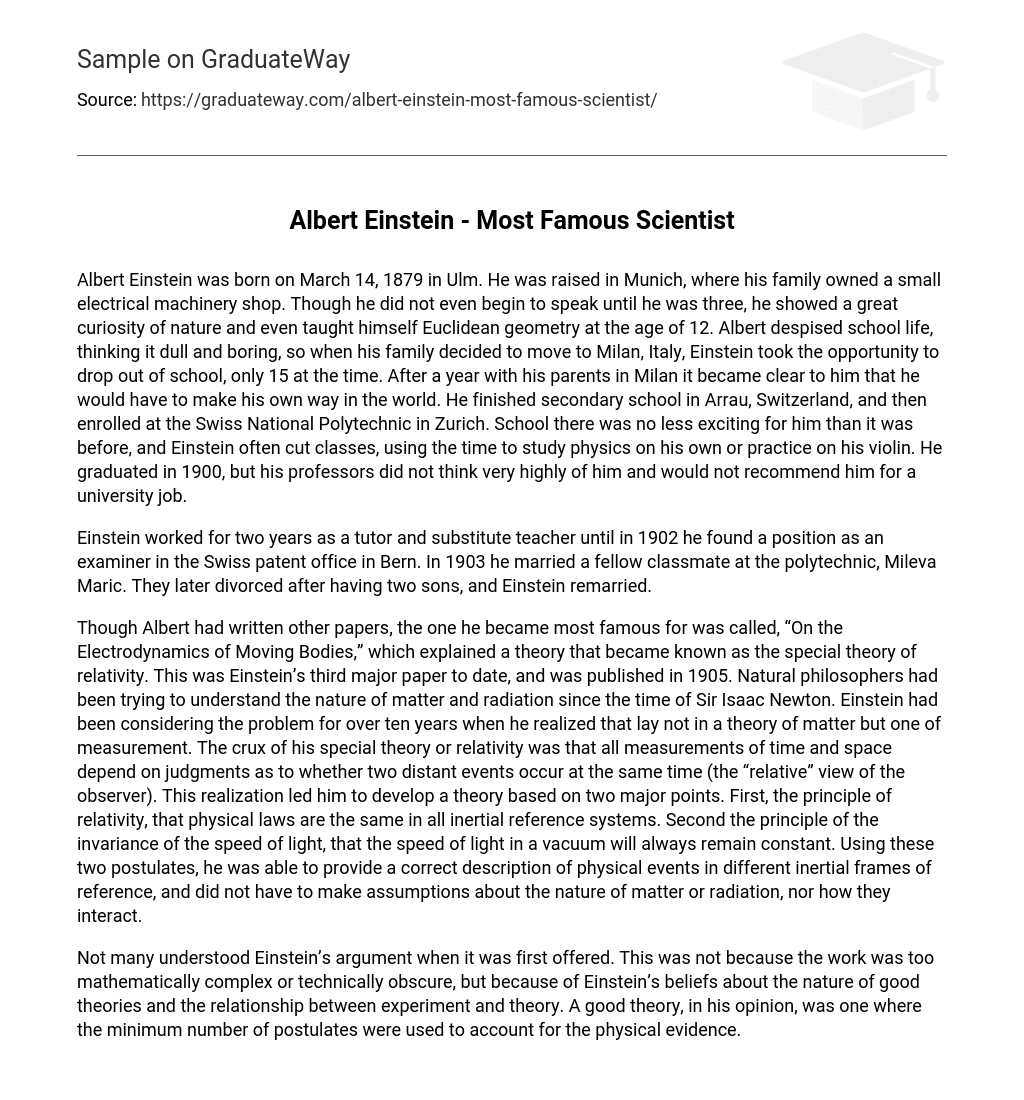Albert Einstein, born on March 14, 1879 in Ulm, was raised in Munich where his family owned a small electrical machinery shop. Despite not speaking until he was three, he showed a strong curiosity for nature and taught himself Euclidean geometry at the age of 12. Disliking school, Einstein left at 15 when his family moved to Milan, Italy. After spending a year there with his parents, he realized the need to forge his own path.
Einstein finished secondary school in Arrau, Switzerland and then enrolled at the Swiss National Polytechnic in Zurich. His experience there was no more exciting than previous schooling as he often skipped classes to independently study physics or practice playing the violin. Graduating in 1900 did not earn him high praise from his professors who did not recommend him for a university position.
Einstein worked as a tutor and substitute teacher for two years before finding a job as an examiner at the Swiss patent office in Bern in 1902. In 1903, he married Mileva Maric, a fellow classmate from the polytechnic. They had two sons together but eventually divorced. Einstein later remarried.
Albert’s most famous paper, “On the Electrodynamics of Moving Bodies,” introduced the special theory of relativity. Published in 1905, it was Einstein’s third significant paper. Scholars had been studying matter and radiation since Sir Isaac Newton’s time. After more than a decade of contemplation, Einstein realized that the key aspect was not a theory of matter but one of measurement.
The core idea behind his special theory of relativity was that all measurements of time and space rely on determining whether two distant events occur simultaneously from the observer’s perspective (the “relative” view). Based on this realization, Einstein developed a theory with two fundamental principles: the principle of relativity and the principle of the invariance of the speed of light.
The principle of relativity states that physical laws remain consistent in all inertial reference systems. On the other hand, he introduced the principle of the invariance of the speed of light which states that its speed remains constant even in a vacuum. By applying these postulates, Einstein accurately depicted physical events in different frames without assuming anything about matter or radiation or their interactions.
Initially, many people struggled to grasp Einstein’s argument. This difficulty did not stem from its mathematical complexity or technical obscurity, but rather from his beliefs about theories and the relationship between theory and experiment. According to Einstein, a good theory should explain physical evidence using the fewest possible postulates. He rejected the notion that experiments logically lead to theories, instead considering scientific theories as products of intuition and experience – the sole source of true knowledge. The absence of numerous postulates in Einstein’s work made it challenging for his colleagues to comprehend, although physicist Max Planck provided crucial support. While gradually gaining recognition within the physics community, Einstein continued working at the patent office until his rapid advancement in academia in 1909 when he secured his first academic appointment at the University of Zurich. By 1913, he had risen to become director of the Kaiser Wilhelm Institute for Physics in Berlin.
Albert Einstein, a renowned physicist, achieved widespread recognition for his contributions to the field. He was honored with the Nobel Prize in 1921 and received numerous accolades from scientific societies worldwide. Despite being an advocate for peace and the Zionist movement, Einstein collaborated with other physicists during World War II to inform President Roosevelt about the potential development of an atomic bomb. He had fled Germany due to Hitler’s rise to power and worked towards peace throughout most of the war. Afterward, he actively campaigned for international disarmament and the establishment of a global government while remaining committed to Zionism. However, he declined an offer to become president of Israel. In the 1940s and 1950s, Einstein emphasized that American intellectuals should sacrifice anything necessary to preserve political freedom. On April 18, 1955, at age 76, Einstein passed away in Princeton.





